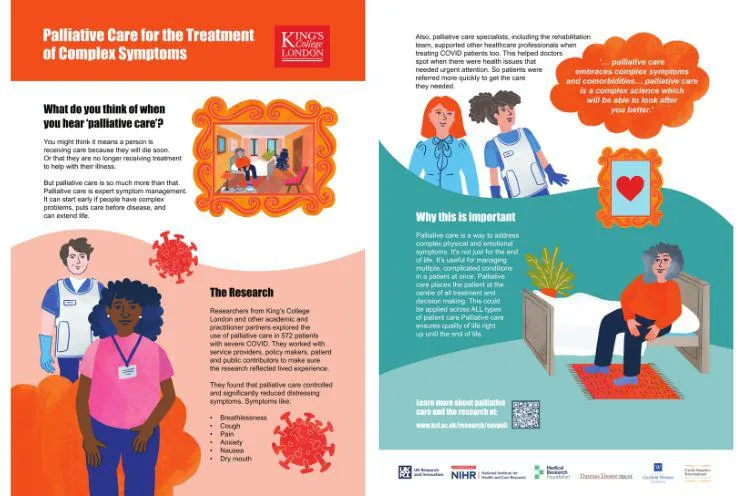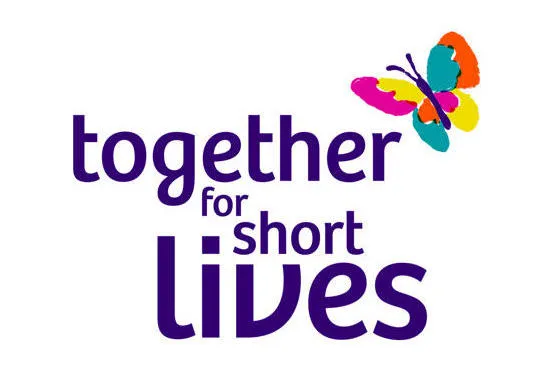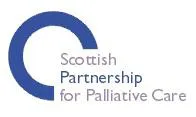CovPall: Rapid Evaluation of the COVID-19 Pandemic Response in Palliative & End of Life Care
Although many people recover from COVID-19, some have very severe symptoms, and sadly, some die. To support people in many settings, palliative care services and hospices have rapidly changed how they work. They are supporting existing patients who do not have COVID-19, and also those with COVID-19 who have severe symptoms or are dying. In addition, the symptoms that people experience, and the best treatments for these symptoms, are not well understood. Therefore, there is an urgent need to understand how palliative and end-of-life care services have responded to COVID-19. Learning from each other will speed up the responses and help future plans.
The CovPall project has two main work packages: WP1 collecting data at service level (from 458 services, 277 UK) and Work Package 2 collecting patient level data (572 patients).
Through the CovPall project, we want to understand how palliative care and hospices responded to COVID-19 pandemic and determine changes in symptoms among people severely ill or dying with COVID supported by palliative care, and associations with treatments and survival.
As part of this project, we produced:
- An infographic on palliative care titled ‘Palliative Care for the Treatment of Complex Symptoms’ (see image below).
- A short film on palliative care and its role in management of complex symptoms

Aims
- To find out how palliative care and hospice services have changed, how their staff, volunteers and others have adapted what they do, and their challenges and innovations. We have referred to this as Work Package 1 (WP1).
- To know what symptoms and problems patients have, how they change over time, what treatments/therapies are used and what seems to work best. We have referred to this as Work Package 2 (WP2).
Methods
This CovPall Project includes a cross-sectional online survey of palliative care services & hospices and a multicentre cohort study of COVID-19 patients seen and treated by palliative care services.
Summary of Findings
Work Package 1
During Work Package 1, 458 services completed the survey. We had a balanced mix of services, including roughly equal numbers of charity managed and publicly managed services. Services worked across hospitals, inpatient palliative care units, home care teams and some provided home nursing.
Most services described being overwhelmed by people with COVID-19 while trying to also look after their existing patients. In general, community and hospital palliative care teams had a large surge in patients to care for. 91% of services changed how they worked.
81% of services cared for patients with suspected or confirmed (by test) COVID-19. Three groups of patients dying from and/or with severe symptoms due to COVID-19 were observed:
- patients with underlying conditions and/or multimorbid disease not previously known to palliative care (70% of services);
- patients who were already known to palliative care services (47% of services); and
- patients, previously healthy, now dying from COVID-19 (37% of services).
More than three-quarters of services reported having staff with suspected or confirmed COVID-19. Staff described increased workload, concerns for their colleagues who were ill while spending time struggling to get essential equipment and medicines, and worrying about the financial viability of their service. Major challenges included shortages of: Personal Protective Equipment (PPE) (48%); staff (40%); medicines (24%); and other equipment (14%). Charity managed services were more likely to experience shortages of PPE compared to publicly managed services. Services in the UK were more likely to experience staff shortages compared with those in the rest of Europe or elsewhere in the world.
Work Package 2
Work Package 2 included data on 572 COVID-19 patients seen consecutively and treated by 25 palliative care services across England and Wales, during the pandemic in 2020 and 2021.
The study used the first patient-centred measure adapted for severe Covid, IPOS-COV, to support timely management. We analysed clinical, demographic and survival data, symptom severity at baseline (referral to palliative care, first COVID assessment) and at three follow-up assessments using the Integrated Palliative care Outcome Scale - COVID version.
Most of the patients included in the study were seen by hospital support teams; 496 (87%) were newly referred to palliative care with COVID, 75 (13%) were already supported by palliative care when they contracted COVID. At baseline, patients had a mean of 2.4 co-morbidities, mean age 77 years, a mean of five symptoms, and were often bedfast or semiconscious. 80% white (British or other) ethnic groups, 20% other ethnic groups.
The most prevalent symptoms were breathlessness, weakness/lack of energy, drowsiness, anxiety, agitation, confusion/delirium, and pain. Median time in palliative care was 46 hours; 77% of patients died. Patients deteriorated very quickly; within 48 hours of the first assessment, more than 50% of the patients referred had died. The impact of COVID on individuals was severe.
During palliative care, breathlessness, agitation, anxiety, delirium, cough, fever, pain, sore/dry mouth, and nausea improved; drowsiness became worse. Improvements seen even when patients had less than 2 days in care. Severe breathlessness in COVID patients with co-morbidities should be used as a signal for rapid referral. Moderate to severe breathlessness, agitation and more than one pre-existing health condition as potential triggers to prioritise future referrals. Common treatments were low dose morphine and midazolam.
Impact
The CovPall study was acknowledged as the most impactful applied research – NIHR Applied Research Collaboration South London ‘Know Your ARC awards’.
With a new dissemination grant ‘CovPall-Partners - Better integrating palliative care and improving access through partnerships and co-design across all settings’ (Funding: Medical Research Foundation (MRF-145-0019-DG-HIGG-C0951), Thomas Deane Trust and The Garfield Weston Foundation), we aim to:
- Transform the understanding and integration of palliative care evidence so more people can benefit in a long-lasting way.
- Co-design and share information about the main evidence of the CovPall study, including how to best manage symptoms.
To do this, CovPall-Partners develop and evaluate easily accessible, user-friendly, free resources, for two key groups:
(1) members of the public, patients and those important to them and,
(2) senior leads in the new structures within health and social care, especially Integrated Care Boards (ICBs) and their system partners, such as local authorities and voluntary, community, faith and social enterprise (VCFSE) organisations.
Two co-design online workshops informed by Knowledge to Action Framework included 18 Patient Public Involvement members, 3 representatives from Integrated Care Boards and their partners informed design of two resources:
- An infographic on palliative care titled ‘Palliative Care for the Treatment of Complex Symptoms’
- A short film on palliative care and its role in management of complex symptoms
CovPall-Partners Core Project Team: Professor Irene J Higginson (PI), Dr Sarah Perman, Dr Sabrina Bajwah, Professor Katherine Sleeman, Professor Matthew Maddocks, Dr Mevhibe B Hocaoglu (Project Coordinator), Dr Adejoke Oluyase, Rashmi Kumar (PPI) and Deb Smith (PPI).
Funding: Medical Research Foundation (MRF-145-0019-DG-HIGG-C0951), Thomas Deane Trust and The Garfield Weston Foundation
- News item on ‘COVPALL research cited by World Health Organization’, where one of the key papers on health inequities lead was cited in ‘ Transforming the health and social equity landscape: promoting socially just and inclusive growth to improve resilience, solidarity and peace’ policy document.
- The educational film 'Palliative Care - Shifting the focus from equality to equity' addressing racial inequality in healthcare delivery, informed by the findings of the CovPall study from Work package 2 (Bajwah et al 2021).

Principal Investigator
Investigators
Affiliations
Project websites
Funding
Funding Body: Medical Research Council
Amount: £ 280,948
Period: April 2020 - April 2021











